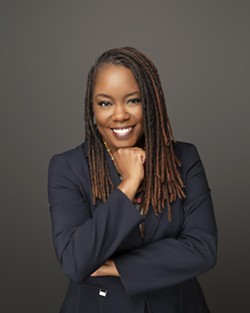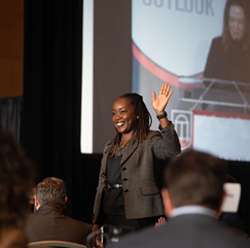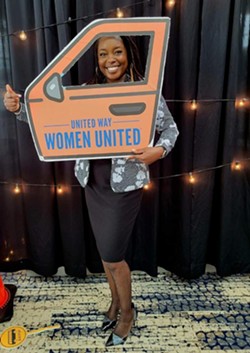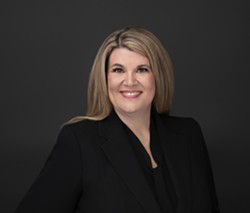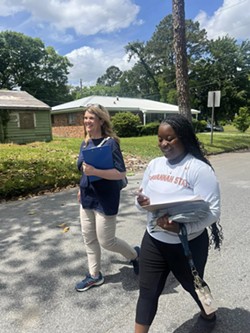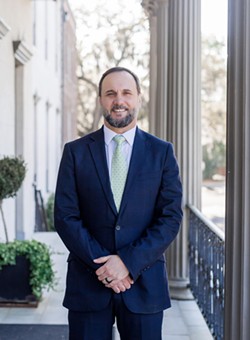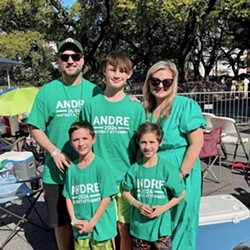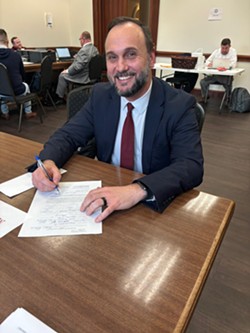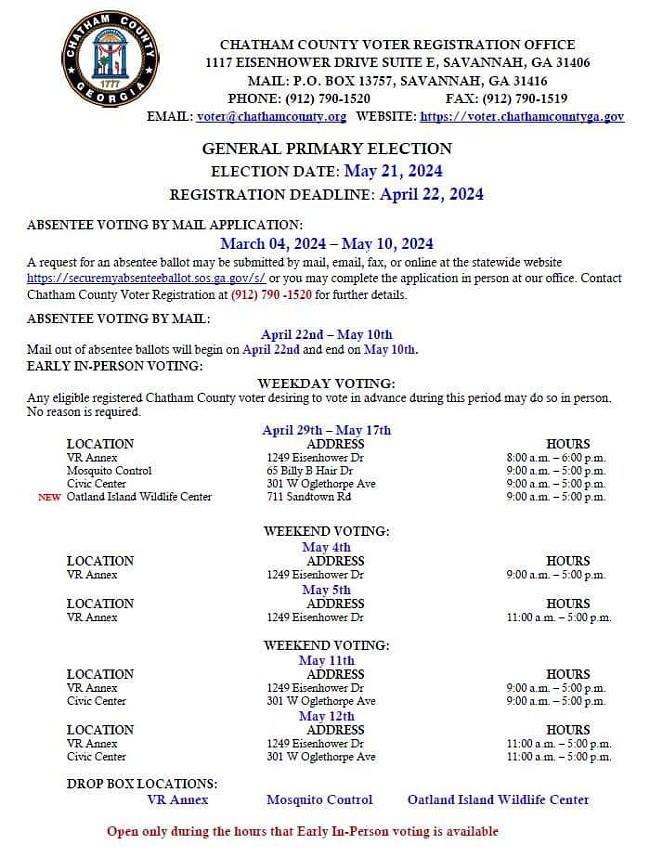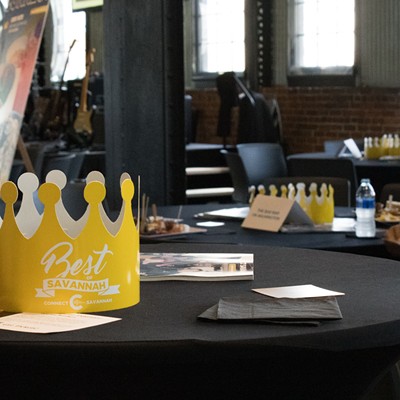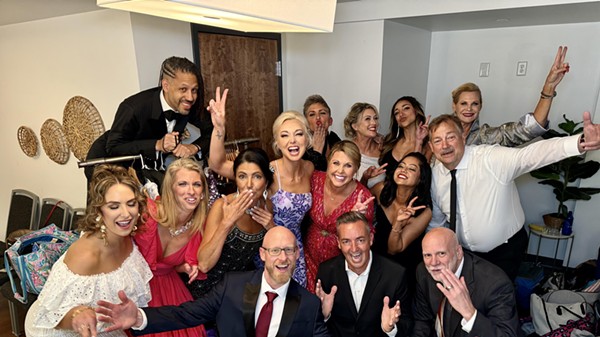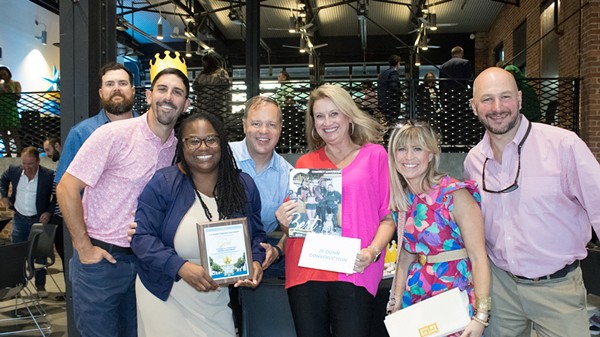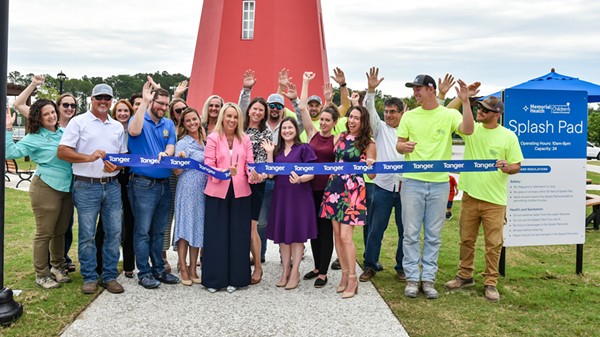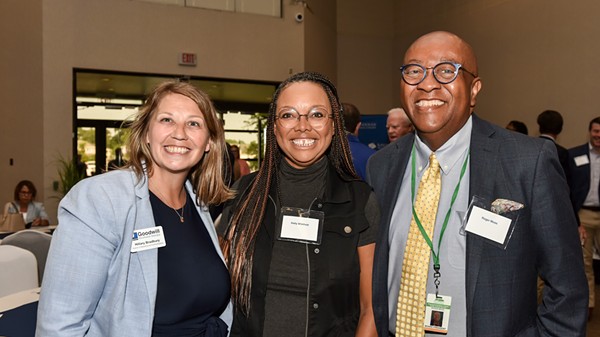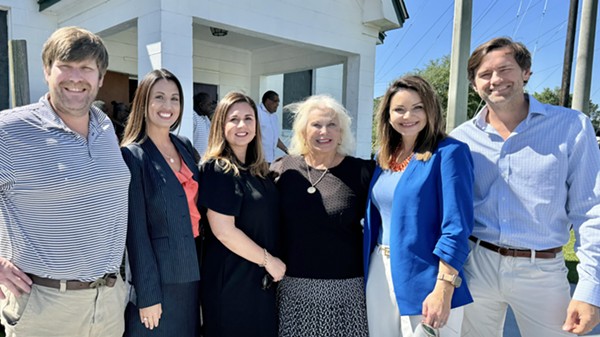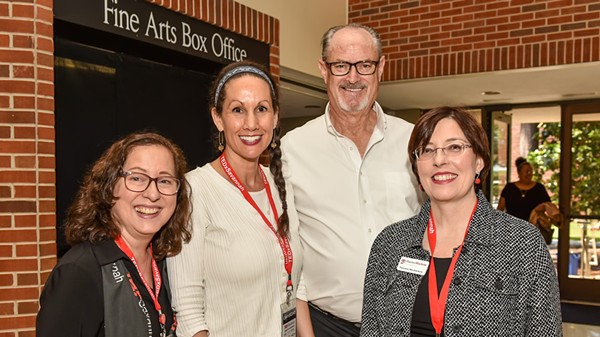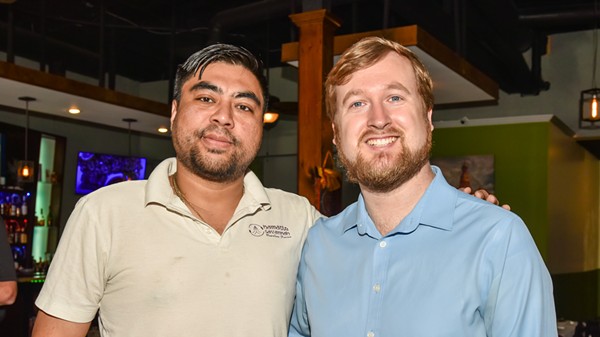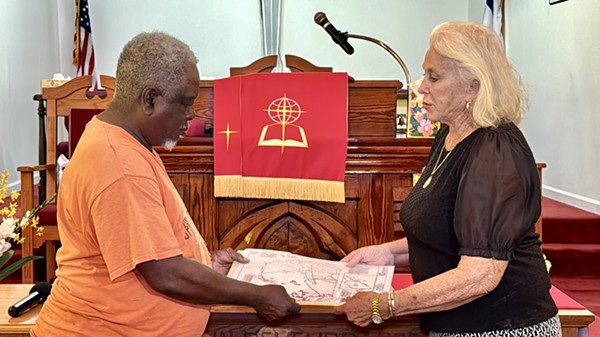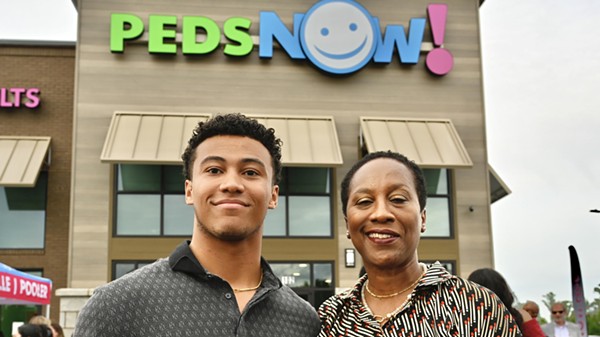Race For Chatham County District Attorney Heats Up
With early voting underway for the May 21 primary election, candidates for District Attorney are crisscrossing the Eastern Judicial Circuit which encompasses all of Chatham County.
Even though none of the three candidates running for Chatham County District Attorney are political party operatives, nor have they even been a precinct delegate for their respective party affiliation, the office of district attorney is a partisan election with candidates running on the May 21 primary ballot.
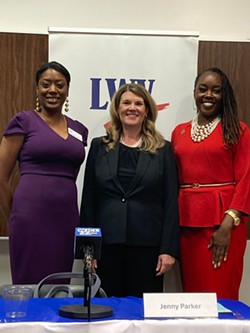
Incumbent Shalena Cook Jones is on the Democrat ballot with Jenny Parker; Andre Pretorius is the sole candidate on the Republican ballot.
Whichever woman wins in the Democratic primary will face off with Pretorius in the November 5 general election.
In Georgia, candidates for district attorney must run on a partisan ballot, albeit there have been attempts to change Georgia law so that races for all 50 judicial circuits would be nonpartisan races.
Most recently, in 2023, HB48 was sponsored by Representative Jesse Petrea (R-166), and Representative Ron Stephens (R-164). The bill would have required that district attorneys and solicitors-general of state courts be elected in nonpartisan elections, but the bill did not make it out of committee.
Petrea says, “We are not benefitting ourselves across the state when we bring party politics into elections for DA. It is easy to focus on parties versus the qualifications of the candidates. We need district attorneys who will hold people accountable. A DA is the chief law enforcement officer of the jurisdiction. The job of a DA is to hold criminals accountable and protect victims, that is an equal issue across party lines, it is about public safety.”
Julie Wade, a local attorney and executive director of Tharros Place, a home for survivors of human trafficking says, “This is the most important race on the May ballot. The office of the District Attorney is what holds the fabric of our community together.”
“The office holds law enforcement accountable, holds the accused accountable, and is the accountability for victims. You don’t think that you are impacted, until you are - any of us could be involved in a case, being a victim or accused,” says Wade
Amanda Hollowell, Managing Director, National Organizing at When We All Vote says, “DAs are supposed to serve the interests of the people who live in their county. DAs are public servants who not only work in courtrooms, but also affect your day-to-day life by supporting or opposing statewide policies and deciding how to spend taxpayer dollars.”
“The public should know that they just don’t prosecute and work with law enforcement, they also support or help protect victims. These are our tax dollars at work, and the public should educate and advocate that they are being used to help create a better and just society,” continues Hollowell.
“Everyone should go vote in the DA race because it impacts all of us. If you are hard on crime or want to see more reformative justice standards implemented, most of this happens in the DA office,” encourages Hollowell.
Connect Savannah asked the three candidates questions.
Shalena Cook Jones - incumbent - Democrat candidate:
Connect Savannah: Why do you want to be re-elected as Chatham County District Attorney?
I have been honored to serve as the Chatham County District Attorney these past few years. I ran for this office because I am passionate about justice, fairness and equity. In no other place are these principles more critical than in the criminal justice system. I have always been fascinated by the relationship between crime and human behavior- especially in poor and urban communities. In fact, "Cops" was my favorite television show back then. Somehow, I believed that if we could understand the driving factors of crime and human behavior, then we would be in a better position to address it and, by extension, prevent or at least reduce it. So, I studied sociology and legal studies at Spelman College and then got my law degree from UGA. But, the more I studied, the more I saw that the criminal justice system had more flaws than strengths and produced more failures than successes. Our nation spends billions of dollars building more jails and incarcerating more people each year, yet our communities and victims are not any safer because of it. I grew up in the 70's and 80's when the War on Drugs was really popular. Sadly, it led to mass incarceration and jail expansion, but didn't even make a dent in getting dangerous drugs off the street. I became DA because I believe that our system needs improvement. A better system should produce better results. Out of all justice entities, the District Attorney is in the best position to ensure that the system is efficient, fair and effective. I am seeking re-election because I believe I have a plan that can get us there.
Connect Savannah: Outline your stance on a prosecutor’s responsibility to a community.
The prosecutor's role and responsibilities are defined by Georgia's Professional Rules of Conduct and the Court's interpretation of Special Rule 3.8. The prosecutor is a "minister of justice" whose role is to seek and present the truth in a court of law for the prosecution and resolution of cases such that victims are protected and public safety is preserved.
Connect Savannah: What life experiences have shaped your views on justice?
Growing up in Brooklyn's inner city in the height of the crack epidemic, I observed a very strange power dynamic between law enforcement and the people in my community. It was hostile, tense and aggressive - on both sides. While many of my young contemporaries were taught to trust cops and viewed them as helpful, everything I knew about the police from what I'd learned about the Civil Rights movement, the Rodney King case, and my everyday life in public housing taught me to fear them. I felt policed rather than protected. After graduating from law school, I practiced insurance defense where I often had to defend officers, cities and governments in deadly force shootings and other officer-involved matters. I learned that they were human. I learned about the difficulties of their job and the split-second decisions they had to make. I developed a sense of empathy for them. I've lost loved ones to violent crime and had loved ones in the system for committing crimes. The ultimate lesson here is that no one is all good, no one is all bad, and everyone has a story. Justice demands that prosecutors evaluate each case on its own merits and have a full understanding of all the facts and circumstances rather than making snap judgments based on emotion, internal bias and personal experiences. To do anything less would be unjust to the victim, the accused and the public.
Connect Savannah: If re-elected, what will you do to retain prosecuting attorneys in your office?
For far too long, there has been a huge earning gap between prosecutors and their private sector counterparts. I have specifically requested retention bonuses and increases for my staff. I have worked hard to improve their work-life balance by providing flex days and work-from-home opportunities where possible. Also, everyone wants to feel appreciated so I am intentional about acknowledging their efforts and celebrating them for a job well done, personally and publicly. I provide my office and staff with as much training and support as they need so they feel confident and well-equipped to do their jobs. I've added paralegals to each unit to lift the administrative burden so prosecutors can devote more of their time to legal business. I have offered leadership, communication and conflict resolution training to improve the culture of the office and reduce workplace stress. I have worked to create a culture of teamwork so there are no big I's and little you's and everyone feels included. I will continue to do these things and, of course, advocate for better pay when I'm re-elected to office.
Connect Savannah: If re-elected, what will you do to address the concerns of victims - to help them be heard and allow them the opportunity to heal?
Aside from case notification, which is the bare minimum, every victim deserves to be heard and it is their legal right to be treated with dignity and respect. Where possible, I make an effort to meet with as many victims as I can, and have often met with their attorneys and other family members too. Our office has partnered with the Board of Pardons and Paroles in sponsoring a Victim Impact Session, which allowed a select group of victims and families an opportunity to update us on the long-standing impact that the case has had on their lives and explore service options. Going forward, we will focus on getting more substantive training so that our advocates act more as guidance counselors rather than administrative assistants. At present, victim compensation for counseling and treatment is provided on a reimbursement basis. I would like to partner with local grief counselors and therapists so that we can provide victims with direct services at no or low-cost if they express interest in that.
Connect Savannah: If re-elected, how will you manage the limited financial resources of your office?
The growing caseloads and national prosecutor shortage means that District Attorneys have to be even more selective about the cases they spend their resources on. Unfortunately, recent laws on prosecutorial oversight means that DAs do not have the discretion they once had to decline or dismiss cases. This is why my staff and I have worked hard to create pre-trial diversion programs to address the 81% of low value cases like drug possession, property crimes, petty theft, traffic offenses, victimless crimes and non-violent incidents. These kinds of cases have little impact on public safety, but take up the lion's share of time, talent and resources because of the sheer volume of them. Finding alternative ways to deal with these cases will allow us to devote more time and effort to serious violent crimes, gang cases, gun charges, DUIs and other offenses that threaten public safety.
Connect Savannah: If you could make one change to the criminal justice system that would promote justice, fairness, and equal treatment under the law, what would it be and why?
If I could make one change, it would be to eliminate all laws, practices and policies that give rise to racial, social and economic injustice and that disproportionately impact one group more than another. Cash bail is one example. The cash bail system disproportionately affects poor, minority, disabled, mentally-ill and drug addicted populations much more than it affects their wealthy, (more often) white counterparts. People who have cash, capital and real-estate (and who can afford to hire private counsel) tend to have a much easier time navigating the criminal justice system. They spend less time in jail and often get less harsh sentences than those in the first category. This makes the cash bail system inherently unjust, overly-broad (due to recent Georgia legislation) and archaic, particularly because we now have more effective, cheaper options available to ensure a defendant's appearance in court.
Connect Savannah: What do you think is the biggest threat to our criminal justice system?
Legislators with partisan, political agendas and ill-informed, under-developed ideas of how the criminal justice system really works.
Connect Savannah: Public safety has historically relied on outdated language and “tough-on-crime” policies. There is, however, significant research and examples that show restorative justice, diversion, education, and treatment increase public safety. As district attorney, how will you work to change the public’s understanding of how public safety can be achieved?
Because the District Attorney's role and responsibilities are so vast and the day-to-day operations of the office are so intense, community outreach and education is a very big challenge. The advent of cell phones and social media has also increased the public's demand for information, some of which is prohibited by law. However, having a strong Public Information/Communications Director and Comms strategy is the first step. We have also found that our Neighborhood Association Meeting Program and in-person and virtual town hall meetings help. Last year, we held our first Community Resource Fair to educate the community about our policies and programs. We are in the process of updating our website to make it more interactive and will include a landing page for data updates, articles, quarterly/bi-annual reports, press releases and position statements. In the next term, I would like to try print and digital newsletters as well.
Connect Savannah: Will you pledge to articulate a mission and vision for the Office that places the focus on justice, rather than winning cases, and align the work of the Office - including internal and external communications, training, policies, and hiring and promotion practices - to reflect that mission and vision?
Yes! The mission and vision statement was one of the first things we worked on when I took office in 2021. "We are a diverse team of legal professionals pursuing justice for the citizens of Chatham County through efficient, equitable and effective prosecution, strong victim advocacy, and community-based strategies to prevent and reduce crime." Though it is not codified in written form, we have fostered an office culture which focuses less on conviction rates and wins and more on maximum effort, effective outcomes, and reduced recidivism. This is communicated to the staff through in-office trainings, meetings and the annual performance review process.
Jenny Parker - Democrat candidate:
Connect Savannah: Why do you want to be Chatham County District Attorney?
Being a prosecutor has always been more than a career for me; it is a calling and it's part of who I am. It has been a way for me to use my talents to serve my community and fight for crime victims. I decided to run because our DA's office is currently understaffed and inexperienced. Our community deserves better. I have the experience and the leadership to build the kind of DA's office that our community deserves.
Connect Savannah: Outline your stance on a prosecutor’s responsibility to a community.
The core of a prosecutor's responsibility is to seek the truth and seek justice. We owe our community a professional prosecutor's office with good judgment and transparency. I believe that we can work to keep the community safe from dangerous offenders, while working with community partners and using creative solutions to address non-violent crimes.
Connect Savannah: What life experiences have shaped your views on justice?
The 24 years that I've spent as a prosecutor have certainly shaped my views on justice. As prosecutors, we are responsible for protecting the rights of every side of a criminal case - the rights of the victim as well as the rights of the accused. I've seen what the resolution of a case can do for a victim or victim's family. I've also seen what second chances can do in the lives of some who are accused of crimes. The decisions we make are not always easy, and we must balance a lot of factors and use good judgment in making those decisions.
Connect Savannah: If elected, what will you do to retain prosecuting attorneys in your office?
It is critically important that the District Attorney treat employees respectfully and professionally, and give employees a seat at the table in shaping office policy and how we approach our work. I am trained in The Leadership Challenge model that some readers may be familiar with. I believe it is very effective. Further, there needs to be a structured onboarding and mentoring program to make people feel accepted and supported in the office, and employees must feel that their jobs are safe.
Connect Savannah: If elected, what will you do to address the concerns of victims - to help them be heard and allow them the opportunity to heal?
I have worked very closely with victims for years as a special victims' prosecutor. Victims must be informed about the criminal justice system and the progress of their cases through the system. They need to be included as much as they are willing to be, and notified of every court appearance. Victims should be consulted about plea offers and given an opportunity to be heard in court. Victims of violent crime should always be made aware of counseling services available to them and encouraged to use those services. The current DA's office has lost several of its Victim Advocate positions and that needs to be remedied as soon as possible.
Connect Savannah: If elected, how will you manage the limited financial resources of your office?
Those resources can be managed by prioritizing the greatest needs and documenting where there is real need for additional funding. Our County Commission has historically been sensitive to the needs of the office, when those needs are documented and evidence is shown as a basis for additional funding. In addition, the office needs to be engaged in more efforts to seek grants.
Connect Savannah: If you could make one change to the criminal justice system that would promote justice, fairness, and equal treatment under the law, what would it be and why?
Most immediately, I believe we can address pre-trial custody and sentencing to make the system work better for everyone. Prosecutors should always be mindful of why we request that a person be held pre-trial or sentence to incarceration. It should never be done just because that's what we have done historically. There should be a legitimate community interest or need for an accused person to be in custody or for a convicted person to be sentenced to jail or prison.
Connect Savannah: What do you think is the biggest threat to our criminal justice system?
The loss of experienced prosecutors is a huge threat to our criminal justice system. We need ethical, trained, experienced prosecutors with good judgment to protect the rights of both victims and the accused.
Connect Savannah: Public safety has historically relied on outdated language and “tough-on-crime” policies. There is, however, significant research and examples that show restorative justice, diversion, education, and treatment increase public safety. As district attorney, how will you work to change the public’s understanding of how public safety can be achieved?
A much better approach is "tough only on some crimes." There are a small percentage of people charged with crimes who are truly dangerous to our community. We need to continue to be tough on those convicted of crimes like murder and sexual assaults. However, the fast majority of people charged with crimes are not dangerous. We need to continue to come up with creative solutions to those cases, like diversion and education. Mass incarceration is not a solution to anything, and harms a huge segment of our population. We can change the public perception of this by being open about why we handle certain cases the way we do, and working with community partners to educate.
Connect Savannah: Will you pledge to articulate a mission and vision for the Office that places the focus on justice, rather than winning cases, and align the work of the Office - including internal and external communications, training, policies, and hiring and promotion practices - to reflect that mission and vision?
Yes. As I said in the beginning, a prosecutor's job is to seek the truth and to seek justice. That is always the goal and should always be the focus of a DA's office.
Andre Pretorius - Republican candidate:
Connect Savannah: Why do you want to be Chatham County District Attorney?
I want to be the DA because I care about victims, the victims
need justice and victims need to know that their voices are being heard in the court system. I have heard from numerous victims and have been told that they have not received the help that those victims need, but instead their cases have been downplayed as to the seriousness of violent crime and some cases have been closed to lesser charges without consulting those victims. The role of the district attorney is to create a fair system of justice that appropriately holds criminal offenders accountable and delivers justice for victims. I will restore the District Attorney’s office’s professionalism, integrity and trust. Such professionalism and integrity will restore the trust in the District Attorney’s office not only for victims of crime, but also the citizens in the community, and our law enforcement agencies. Having a strong relationship with our law enforcement agencies will foster good cases and a renewed trust from victims of crimes that their voices will be heard. Victims in this County have gone through eight or nine different prosecutors, telling their story eight or nine times adding more trauma to the trauma they have already suffered. It is time for new leadership. Governor Deal started the Criminal Justice Reform in Georgia and I wholeheartedly believe in his ideals of rehabilitating the offenders that need rehabilitation and removing from our community those individuals that we are afraid of, who cause our citizens to be locked behind bars in their own homes, and who choose to murder, rape, and molest. As DA, I will bring the community partners to the table to help rehabilitate those offenders who need the help, to get them educated and to get them back in the workforce so that they can be productive citizens and pledge to hold those who commit serious violent crimes accountable for their crimes.
Connect Savannah: Outline your stance on a prosecutor’s responsibility to a community.
The prosecutor’s responsibility to the community is shaped by the ethics
we are sworn to uphold as a prosecutor. Only prosecute a case which you believe you have probable cause that a crime was committed, but also ensure that you are prosecuting a crime that the community wants you to prosecute. A prosecutor is not the police, a prosecutor has to follow the laws that the legislature sets forth, by seeking justice, based upon our ethical obligations.
Connect Savannah: What life experiences have shaped your views on justice?
I think I have a very unique perspective, because I grew up in South Africa, where my mom had to raise 3 kids on her own as my dad left when I was 5. We were dirt poor, living paycheck to paycheck. My mom had to work hard to provide for us and she is a domestic violence survivor. I saw a great man, Nelson Mandela, released from jail, become president and institute the Truth and Reconciliation Commission. When I moved to the United States, I learned fast that a person must work hard to achieve the American dream. During that time, I was homeless for a while, I was arrested for a suspended driver’s license, but learned from that experience that prosecutors can change your life, I got back in school at Georgia State University part time at night, I worked in construction during the day to pay my own way. I Worked in construction throughout law school and finally became a prosecutor. Throughout this process, I had a great friend that helped me through the tough times and met my beautiful wife who has been my biggest supporter. Knowing the struggles I went through, I can sympathize and empathize with the problems that people (victims and defendants) face in their daily lives, so that I can help them get back to where they can feel in control of their situation. The key is rehabilitation. Compassion for people has led me to start the State Court diversion programs, Domestic Violence Court, the homeless dockets in Recorder’s Court, be involved in non-profit organizations that help the under privileged youth and domestic and sexual assault victims, and become a leader in youth programs. There is a zulu proverb that I try to live by: “Umuntu Ngumuntu Ngabantu” which roughly translated means that we must respect and serve our fellow people. These are all things that made me learn the value and the power a prosecutor has to change and shape the justice system, to help make our community safer.
Connect Savannah: If elected, what will you do to retain prosecuting attorneys in your office?
When I worked as the Deputy Chief Assistant in State Court, I would not only be a part of the hiring process, but I would also get to train all of the new prosecutors. A critical step in retention is training and working with new prosecutors to get them to understand the importance of their job. People always say that money is what attracts prosecutors, but this is not correct. People become prosecutors because they want to make a difference, they want to go to sleep at night knowing that they have done the right thing, and because they know that they can always progress in their careers as a prosecutor. Training is critical in this process, so I would bring in experienced prosecutors to train new attorneys on the intricacies of trials, on how to prepare cases for trials, and train them to evaluate cases. Talking to and Training prosecutors to care about their victims, will help them stay, because the prosecutors get to see those individuals at the worst moments in their lives and as the prosecutor they are the person that will help the victim get their voice in court. I still have victims come up to me and send me messages to let me know how they are currently doing. Showing new attorneys the difference they made in someone’s life and having them experience that is why people choose to stay in prosecution. This is the same with people that have committed a crime, because when you teach a prosecutor to be compassionate towards their situation, to truly understand how and why people need to be rehabilitated and to see that treatment work, creates career prosecutors.
Connect Savannah: If elected, what will you do to address the concerns of victims - to help them be heard and allow them the opportunity to heal?
This is one of the most important functions of the DA. The Crime victims’ bill of Rights dictates that we have rules to follow. This means that victims have to be present for all court proceedings, that victims have to be notified of all plea offers, court dates, and have to be allowed to give a victim impact statement. These are only a few things that I have to do as the DA, but there is so much more that we can do. I would like to see the return of the SVU division in the DA office and reopening the family Justice center. A place where we are able to not only have victim interviews, but also a place where a victim can feel safe, receive treatment for medical injuries and mental health concerns. Where we can find a safe place for them to stay and place where we can offer additional resources, such as help with employment, help with their kids, and help with the trauma.
Connect Savannah: If elected, how will you manage the limited financial resources of your office?
The DA’s office budget is currently around $9 million. This excludes money from grants, and asset forfeitures. I believe that the County Manager and the County Commission sets our budget based upon the needs that the DA’s office has. The goal is to live within your means and to only spend what the commission has given you. Additional funds can be received through grants. I believe the most important people I can hire to help with managing the office’s finances, is a strong office manager that understands the County budget and the rules pertaining to expenditures, and an excellent grant writer.
Connect Savannah: If you could make one change to the criminal justice system that would promote justice, fairness, and equal treatment under the law, what would it be and why?
There is not one specific thing that we could do that would promote justice, fairness and equal treatment. This would require multiple changes, because people have different experiences, different backgrounds, and people have different ideas on what justice should be. I believe the most important change you could make currently is educating your staff. Education would include bringing in local leaders in the community to teach prosecutors about the issues in their community, sending prosecutors to trainings so that they can recognize and address problems up front, and as DA, sitting down with your staff and explaining the goals of the office and tracking the statistics of cases to find out where those problems are.
Connect Savannah: What do you think is the biggest threat to our criminal justice system?
The biggest threats to our justice system is the lack of the use of community resources to help rehabilitate those individuals that need rehabilitation, dismissing cases does not deter crime, and an ever decreasing willingness of people to serve in law enforcement. Without reaching out to the community for help, these individuals find the justice system to be a revolving door as they never receive the help they need to become a productive member of society and as these cases are dismissed, there is no deterrence to re-offend. They continue to commit crimes. These problems include substance abuse, untreated and undiagnosed mental health issues, and a growing population of youth that drop out of school at a young age. Further, with fewer specialized officers trained in mental health issues on the street to handle the situation quickly, a minor crime can quickly escalate into a major crime.
Connect Savannah: Public safety has historically relied on outdated language and “tough-on-crime” policies. There is, however, significant research and examples that show restorative justice, diversion, education, and treatment increase public safety. As district attorney, how will you work to change the public’s understanding of how public safety can be achieved?
As the Deputy Chief Assistant DA in the prior administration, we implemented numerous diversion programs, a pre-arrest diversion program and kept statistics on those programs. These programs yielded a 95% success rate for individuals who completed the programs to not re-offend. The Mental Health Court, Veterans Court, DUI Court and Drug Court programs yield similar statistics. These programs have proven track records of success and this information needs to be shared with the community. The public will see not only the economic savings by having these people receive the treatment and not being incarcerated at the jail, but also see the long term effects as these individuals now have resources available to them so that they do not end up back in the court system.
Connect Savannah: Will you pledge to articulate a mission and vision for the Office that places the focus on justice, rather than winning cases, and align the work of the Office - including internal and external communications, training, policies, and hiring and promotion practices - to reflect that mission and vision?
As a prosecutor our ethics demand that we seek justice and not prosecute cases that we do not have the evidence to bring a case without probable cause that a crime was committed. Our ethical obligations require prosecutors to focus on seeking justice and nowhere in our ethics does it state that a prosecutor must win a case. Judges and Juries determine the outcomes of cases, it is the prosecutor’s role to present the evidence and give the victims the opportunity to be heard.
Early voting is underway until Friday, May 17 at four locations across Chatham County - VR Annex, Mosquito Control, Civic Center, Oatland Island Wildlife Center.
There is weekend voting at both the VR Annex and Civic Center on May 12 and 13.
Election Day is Tuesday, May 21 and individuals can find the location and directions to their polling place on My Voter Page of the Georgia Secretary of State’s website. Polls will be open on Election Day from 7:00 a.m. - 7:00 p.m.
Individuals who have questions about voting are encouraged to call Chatham County Voter Registration at (912) 790-1520.
People who want to watch the results come in after the polls close at 7:00 p.m., can find results on the Chatham County Board of Elections website.


